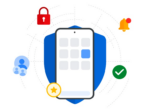
Android 14 has been under development for several months, and finally the source code is being pushed to the Android Open Source Project (AOSP), which is the repository where official Android code is stored and where manufacturers can go to grab the source code and create their own variants.
Many of the updates in Android focus on performance and efficiency. For example, now cached applications will be frozen after a period of time, and updates were also made to how cached apps receive “context-registered” broadcasts in an effort to help keep them frozen longer.
A result of the caching updates is that they were able to reduce the number of cold app starts, or starting up totally from scratch. Reducing this number improves power usage and app startup time.
The Android Runtime also was optimized in several ways, resulting in code size reductions of 9.3% on average.
This OS version also includes several ways that users can customize their experience. They can now scale font sizes up to 200% (up from 130% as the maximum), add language preferences on an app-by-app basis, set regional preferences like temperature units or the first day of the week, and better voice support for users with an accent via the Grammatical Inflection API.
There are many media and graphics improvements in Android 14: support for 10-bit HDR images, upgrades in Camera Extensions, support for lossless audio formats, support for custom meshes, and a hardware buffer renderer in the Canvas API.
Android 14 introduces many features designed to help protect user privacy. There is a new permission for sharing location data with third parties, the ability to grant only partial access to photos and videos in an app, higher restrictions on the number of background services an app can launch, blocking installation of apps that target older SDK versions, and more.
Moving from user to developers, there are many new features Android developers will be able to leverage. These include support for OpenJDK 17, support for Credential Manager and passkeys, Health Connect, updated system sharesheets, and more consistent and reliable foreground services.
As usual, the first devices to get the update will be Pixels, and that roll out will start today. Later this year it will be available on other devices, such as those from Samsung Galaxy, iQOO, Nothing, OnePlus, Oppo, Realme, Sharp, Sony, Tecno, vivo and Xiaomi.
In addition to announcing Android 14, Google also unveiled the Pixel 8 and Pixel 8 Pro, which it describes as being “built with AI at the center for a more helpful and personal experience.” More information about the new phones is available in this blog post.






